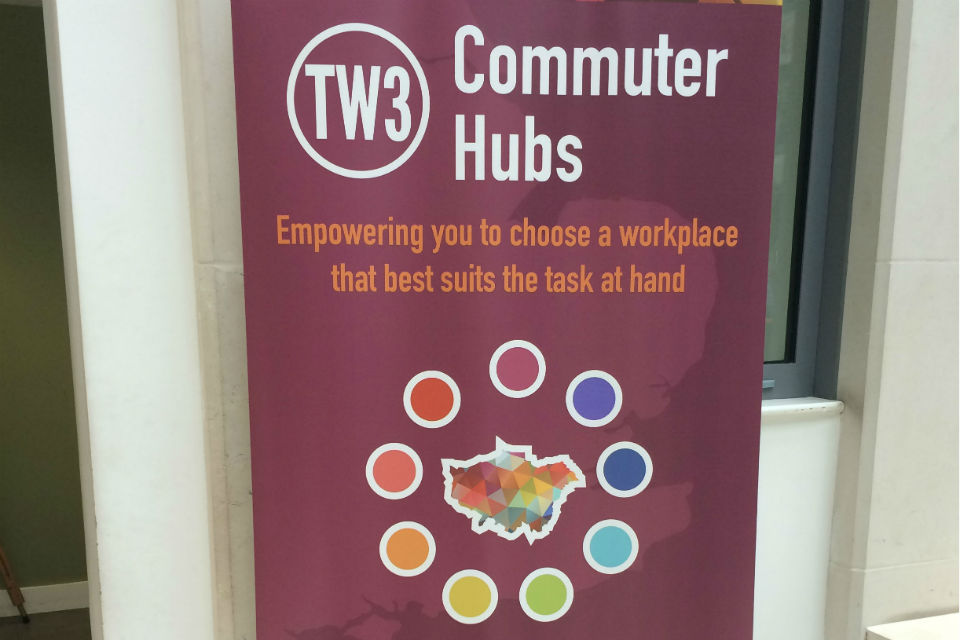
The Way We Work (TW3 for short) is the government’s Smart Working programme, shaping how the Civil Service will work in the future. It is helping people adopt the most modern, evidence-based form of flexible working called ‘Smart Working’. And it is the foundation on which our new Government Hubs will be built.
The world of work is changing. People no longer need be tied to the desk - we can work smarter than that, in a way that saves money on property, that empowers the individual and improves productivity. TW3 is helping government to move away from employment models and management practices which were appropriate for the twentieth century, but not for today.
We believe that smart working is the best way to work for business - and for the individual. We want it to become the default for the Civil Service, for everyone – people at the front line as much as those sitting in Whitehall.
Transforming the way we work
Under TW3 many parts of Government have already responded magnificently and a number of departments are transforming how they work in an exciting way. Smart Working is increasingly being seen as an element of the Civil Service employment offer, supporting a more diverse workforce.

The benefits are immense: a better lifestyle, with positive benefits for recruitment and retention; a reduced carbon footprint; enhanced accommodation of diversity; better mental and physical health; improved productivity; more effective use of property.
That’s quite a list. But what do you need to do to make it happen?
A single code of practice
Over the last 18 months the Cabinet Office has been working with other departments, businesses like EY, Virgin, Vodafone and Microsoft; third sector organisations, subject matter experts and with institutions like CIPD to turn Smart Working from an art into a science. We have pulled together best practice and evidence from around the world into a BSI Publicly Available Specification (PAS3000), launched on the same day as our annual TW3 Awards today (21 January 2016). It sets out for the first time everything you need to make the Smart Working revolution work for you and your team. This is also the first time best practice across the disciplines involved in Smart Working (such as HR, property and technology) have been brought together in a single code of practice.
PAS3000 is aimed at leaders to help guide their thinking about transforming how their organisations and people work. It will sit alongside a maturity self-assessment tool for Smart Working that we are also developing. There is evidence of change all around us, and we are working hard to get the message out to an even bigger audience. The UK is a global leader in this quiet revolution; a revolution made possible by modern technology, but where change can only happen when leaders transform the ethos of how work is done in an organisation. We are hoping that best practice in pathfinder organisations will rapidly become common practice right across the Civil Service.

8 comments
Comment by SB posted on
Why does the code cost money to buy? if this is best practice for the public sector, it should be freely distributed and made available.
Comment by Richard Graham, TW3 Programme Manager posted on
Employing effective practices is a goal for all organisations and businesses, and Smart Working is not restricted to any one sector, it is applicable to all businesses regardless of size or sector. The new Code of Practice is intended for use by all: public, private and not-for-profit sectors, for large organisations and for small.
The concept for PAS3000 was the outcome of work by the Smart Working Charter Steering Group. Chaired by the Cabinet Office, this group consists of industry, academia, professional institutions, subject matter experts and other public sector bodies. The Group identified lack of common understanding and standards as a barrier to enabling organisations to benchmark themselves against high performers (and with the potential as the basis for a certification scheme).
Pulling together best practice for the first time and across disciplines to get a consensus based document accepted with such a diverse stakeholder environment (potentially tens of thousands of organisations) presented a considerable challenge. Sponsoring BSI, the UK’s national standards body, to develop this as a Publicly Available Specification (PAS) provided a robust process of knowledge sharing and consensus building to rapidly develop the type of guidelines the Group envisaged for the Code of Practice. It also ensured document content is vested in BSI and is subject to a regular review process. BSI clearly needs to charge for its services and priced documents are part of its commercial operating model.
Comment by William (MoD) posted on
Mr Mann,
Same old drum again -
I notice that no where in this article is pay mentioned.
How does the SCS expect to recruit and retain the relevant skills when, because of the pay restraints causing a 20% pay difference, skilled people are leaving and the staff engagement and morale is collapsing?
Do you really expect people to want to work for a lot less than they'd get in industry because the work is SMART and the work enviroment is nice?
We have a really nice work environment and we all consider the work for the front line military inportant - but people are leaving as quick as the can because of the pay restrain, increase in pension contributions and changes to conditions.
Comment by Noel posted on
That's a little harsh William, I'm pretty sure that it's elected politicians, and not officials, that determine pay in the Civil Service, just as is the case across the rest of the public sector.
I am really pleased that your work environment is nice - but it isn't necessarily the case for everyone. I think what Bruce Mann is primarily talking about here is government moving away from outdated "command and control" management practices and employment models which were designed perhaps back in the days when the telegraph was the latest technology and everything revolved around processes. And moving to a culture where people are treated like grown-ups and trusted to get on with work assigned to them, giving them freedom to agree with their manager where and when its best done not being corralled in the office every day. Providing that appropriate environment, IT, culture and leadership should certainly be in the power of the SCS.
I have been fortunate to work in such an environment for a number of years myself - I certainly wouldn't want to work any other way.
Comment by William (MoD) posted on
Noel,
Thank you for taking the time to reply to my comment and, in hindsight, I agree that the thoughts were “pretty harsh” towards the SCS and should have been directed at the political dogma that is being imposed on us.
Plus, on reading more about the SCS, it appears that there are difficulties in recruiting them too - re this article (published today in the Civil Service World).
http://www.civilserviceworld.com/articles/news/civil-service-unions-call-one-payrise-senior-officials-vent-frustrations
As for my working environment – it has not always been so good. I spent several years working with ordnance and hazardous chemicals in a depot and on jetties, in all weathers. So, I appreciate the good conditions I am now in.
However, I stand by my comment that ignoring the pay difference caused by the 10 years of pay restraint is causing massive recruitment and retention problems. It doesn’t matter how well that we are treated by management (Government or SCS) or how important the work we do is (in my case provision of equipment for the Armed forces) we do not come to work because of that – we work to pay the bills.
Comment by Kay posted on
"moving to a culture where people are treated like grown-ups and trusted" - How innovative when I thought we were all "grown ups" and apparently a very trusted workforce (latest figures show 59%) already. Perhaps it's SCS and Centre Management who need to stop and think about how they treat people and who they are treating in such a way that isn't like a grown up! It says more about them than the unfortunate staff who are on the end of dated and archaic behaviour.
Also, I'm sure many rank and file would quite happily embrace the latest technology and freedoms of using it but unfortunately it is rarely given to us! The Civil Service doesn't stop at Whitehall you know.
Comment by Noel posted on
Hi Kay - absolutely couldn't agree more - although we've still a little way to go to overtake Hairdressers... 🙂
Comment by Knulp posted on
TW3 ? do people really get paid for coming up with this?